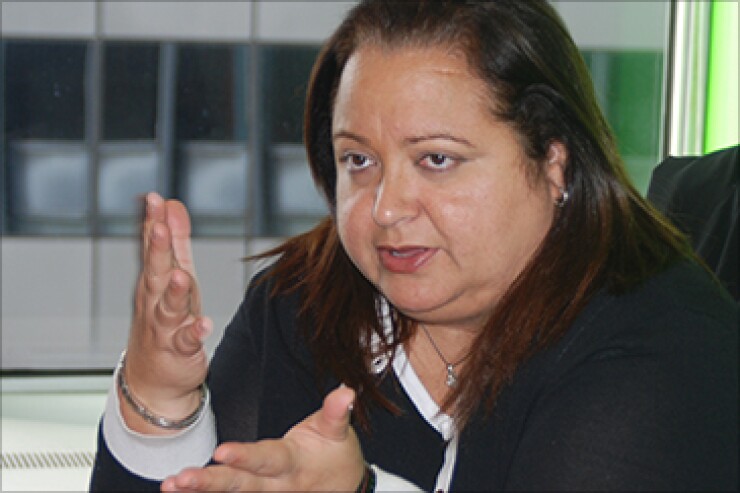
Puerto Rico's default on $37 million of debt payments left bondholders with a narrow range of options to protect their interests as more debt comes due over the next weeks and months.
Puerto Rico on Monday failed to pay $35.9 million of interest on rum tax bonds issued by the Puerto Rico Infrastructure Finance Authority and $1.4 million in interest on Puerto Rico Public Finance Corp. bonds, while making about $1 billion in other public sector debt payments. The next sizable payment date is Feb. 1, when $333 million is due, according to JPMorgan.
The defaulted rum tax bonds have "no events of default listed under the trust indenture, and bondholder remedies are limited to pursuit of legal enforcement of their rights," Municipal Market Analytics wrote in its Weekly Outlook.
Puerto Rico paid some of its authority debts through draws on their reserve deposits. On Dec. 29 Ambac Assurance Corp. and Financial Guaranty Insurance Co. delivered letters to Puerto Rico's government saying they considered the diversion of money from the PRIFA bonds to be illegal. The bond indentures for convention center bonds that were subject to draws indicate that to show a default, bondholders must show that the commonwealth had revenue alternatives to the diversion of funds, MMA wrote. The Highways and Transportation Authority bonds' resolutions neither list events of default nor allow acceleration, MMA said. The prospectuses for the securities whose revenues were "claw-backed" for Puerto Rico GO bonds, say that the commonwealth can "interrupt the flow of revenues to bondholders only if all other commonwealth governmental revenues are together insufficient to pay GO debt service," MMA said.
Michael Ginestro, head of municipal credit research at Bel Air Investment Advisors, said he expects bondholders to file lawsuits soon, in light of the island's use of $120 million to pay Christmas bonuses. Others saw the next few weeks differently.
"Lawsuits can already be filed," said David Fernández, public finance attorney at Buchanan, Ingersoll & Rooney PC. "It is, however, more likely that more aggressive negotiations will occur in an attempt to find some way to address the interests of the affected bondholders prior to their diving into the uncertainty of a court action. If, however, the impasse continues and the declarations by the commonwealth of its inability to meet its obligations persist, the affected bondholders may decide that entering the courts and forcing action on the existing assets may be the best option for maximizing their returns."
Melba Acosta Febo, president of the Government Development Bank for Puerto Rico, said Dec. 30 that Puerto Rico's decision to prioritize payments of the government's own debt obligations on Monday would be made partially "to create the best chance for the commonwealth to be able to negotiate with its creditors in the coming months toward a consensual solution for the commonwealth's debt crisis."
Acosta Febo also said that Puerto Rico expected to make a specific proposal to its creditors in January. On Monday, Puerto Rico Gov. Alejandro García Padilla told CNBC that "Every dollar that [I] need to spend in a lawsuit paying lawyers, it will be a dollar that I will not have available to pay creditors."
The island's legislature is planning hearings in mid-January about Monday's payments and defaults, Puerto Rico Senate President Eduardo Bhatia Gautier said Dec. 30.
In Washington, the U.S. House of Representatives Natural Resource subcommittees will meet on Jan. 12 and Jan. 26 on topics related to Puerto Rico's debt.
While the commonwealth and the bondholders try to work out how to respond to the payments and defaults of Monday, officials may be able to avoid defaults for several more months.
Acosta Febo has said there is money in the debt-service reserves to cover the claw-backed authorities' debt up to and including the July 1 debt payment.
On Monday Standard & Poor's analysts David Hitchcock and Gabriel Petek wrote: "We expect Puerto Rico's cash-flow situation to temporarily improve in January once sales taxes pledged to COFINA [Puerto Rico Sales Tax Finance Corp.] are no longer trapped to pay annual COFINA debt service during the remainder of the fiscal year, but to worsen again as the year progresses and new GO debt service becomes due July 1, 2016."
"We believe Puerto Rico's long-term financial situation remains dire," the S&P analysts wrote. S&P rates Puerto Rico's GO debt CC with a negative outlook.
In Monday's Weekly Outlook, MMA's analysts said that the increasing mainstream media attention to Puerto Rico's debt problem will shift perceptions of blame for the problem from Puerto Rico government mismanagement to "vulture funds" making unreasonable demands for debt payback.
"As they did in Detroit, solutions in Puerto Rico will almost surely depend on political considerations," MMA wrote. "The withering tone with which bondholders are being discussed will only diminish future recoveries."
Many observers and participants either expect or hope the federal government will be key to addressing Puerto Rico's debt problem in the next few months.
"I think 'Rome is burning,' " said John Mousseau, fixed-income manager at Cumberland Advisors. "The federal government will intervene." He said there will be some sort of overseer and that Puerto Rico should try to continue paying the GO and COFINA bonds so that it has access to the capital markets.
While Ginestro said he thought a bankruptcy mechanism would be a bad idea, Fernández said he favored Chapter 9 bankruptcy.
"By not acting, the federal government is giving the litigation route entry to some very uncharted waters, and with that uncertainty will come additional problems," according to Fernández.





